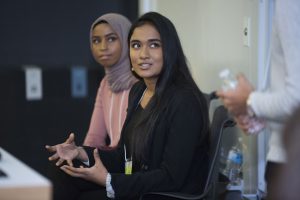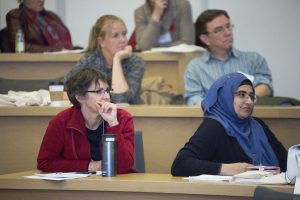Notes from our Making Connections Conference 2017
Students are doing it for themselves!
How students are changing their schools, their communities, and our world
Speakers:Sakaana Yasotharan: who explored ways of increasing enrolment at her high school Tessa Hill and Lia Valente: who succeeded in including consent as part of the sex education curriculum Kherto Ahmed: youth mentor with Success Beyond Limits Moderator: Shams Mehdi, President, Public Boards, Ontario Student Trustees Association
|
Overview:When students feel empowered to make change, stand back, because they will make change happen! Back by popular demand, this year’s student panel will feature students who have used their voice and applied their creativity and problem-solving skills to improve their schools and communities. From helping younger students transition to high school, to increasing enrolment at their school, to changing the provincial curriculum, these students got it done. In this session, you will find out how they did it! |
 Kherto Ahmed and Sakaana Yasotharan |
 Listening to the student panel |
Presentations
Click the panelists names to see notes from their presentations
- Her project was to increase the population of her high school. People in the neighbourhood were dropping out due to many different factors. Everybody who wants to learn should be able to learn.
- Looked at different ways of increasing enrolment
- Believes students should have a mentor, and teachers should help them follow their dreams.
- Students need a guidance counsellor and a friend in their teachers.
- They were allowed to do any project at the end of the year in grade 8. They chose rape culture in the media, and wanted to learn about it from people that were involved in it. They found out that consent was not in the curriculum. They asked if they can add a consent petition into their ISP.
- They realized that social justice is more than just fundraisers, it is about changing things in the world.
- Not every student wants to be an activist, but there is a lot of time where teachers talk at us, which means that there isn’t enough space for students to talk about what they care about.
- Prefers when she feels like more of an equal with her teacher, instead of a power imbalance
- Involved with the Success Beyond Limits (SBL) Education Program, takes place during the summer, for free.
- The morning focuses on life skills, the afternoon focuses on exercise skills. You can get your first high school credit by participating in the program, and also gain a high school mentor. This allowed her to have a smoother transition to high school. The program continued through the school year, so she could ask her mentors questions when she was at school. SBL mentors can help students do their homework and provide other support. The SBL program also helps by increasing graduation rates.
- Students need to be themselves, to feel comfortable, then they are ready to change the world.
Panel Discussion
Sakaana: “Ubuntu”: I am who I am because of who we all are. It is something that we have to be cognizant of, and empathize with others.
Kherto: Leadership is a growing process. If you are not making mistakes, it means that you are not trying hard enough. You will have some lows, and some highs, but the reward will be so much higher.
Tessa: Young people are people, and in order to encourage student activism and leadership, students need to be respected and valued.
Lia Valente: Reach out to students and ask them questions. Ask them what their definition of success is. Most of the important things that I have learned are not academic, they were real things.
Shams: It is hard for him to create change because he has to make changes to complex policies. The policy part is difficult because there is a big information gap. He has only been a student trustee for 2 years, and the trustees have been in their roles for many years, and know the policy well.
Shams: Every single action has a reaction somewhere in the world. We are always one action away from making a positive change for the rest of us.
Question from the Audience:
Some schools do not have these extra programs (ie. SBL) What can these schools do?
- Sakaana: Just give the students a platform
- Kherto: A student-led math homework class builds mentorship skills, it doesn’t have to be something big
- Shams: A mental health conference and transition program for grade 8’s to prepare for high school
- Shams: There are platforms everywhere, people just don’t know about them. The problem is outreach. How can we get people into the programs that do not have that guided push? People have to find and connect with the programs. The onus has been placed on the individual. However, there is a lot of work that can be done by religious/community groups to make connections between students and organizations.
